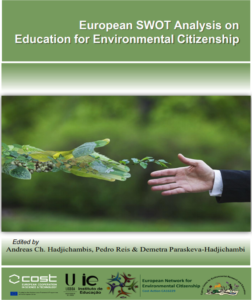Chapter 21: SPANISH SWOT Analysis of Education for Environmental Citizenship
Marta Romero Ariza
Abstract: The content analysis of experts’ responses consider Education for Environmental Citizenship necessary to tackle current societal challenges and reveal a complex conceptualisation of the construct integrating features from other related approaches to enact a new model of citizenship. However, they consider it to be a complex and highly demanding educational approach that goes beyond the usual boundaries of teaching and learning. Its intention is to shape people’s beliefs and habits, to deeply affect personal and social values and behaviours in order to pro-mote highly committed citizens who are actively engaged in the mitigation of environmental problems. Additionally, they believe that Education for Environmental Citizenship is not a well-known concept at a national level and can be confused with other approaches such as Citizenship Education (CE), Environmental Education (EE) and Education for Sustainable Development (ESD). They mention the difficulties of integrating Education for Environmental Citizenship into the Spanish educational system, due to the current school structure and curriculum and the lack of concern, recognition and preparation from teachers. The other main threat mentioned by experts relates to the predominant economical model and consumerist values that go against Education for Environmental Citizenship goals and suggest reinforcing social networks of people sharing Education for Environmental Citizen-ship concerns. As opportunities, they mentioned an increasing preoccupation for environmental issues, particular trends in teacher education, the possibilities offered by current technologies, and specific programmes and funding in this line.

